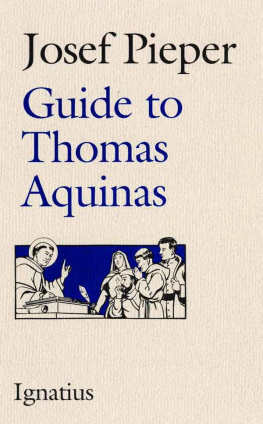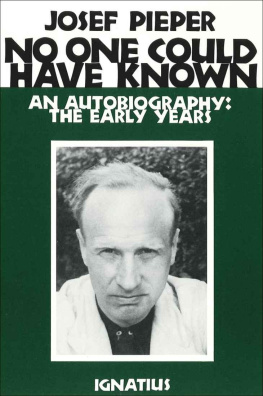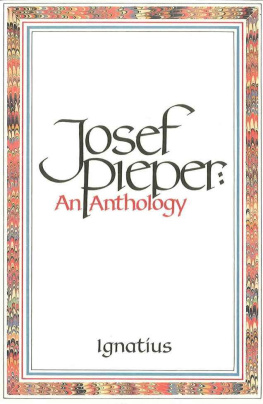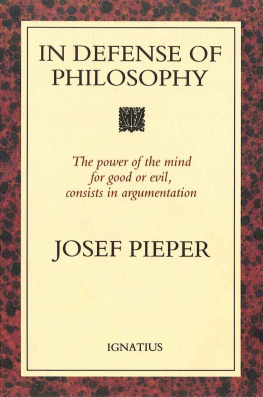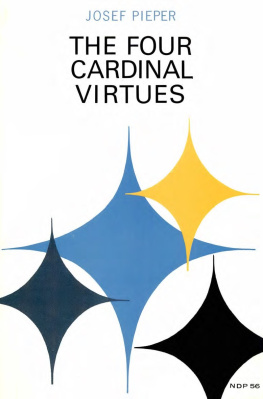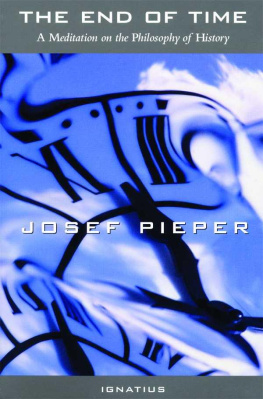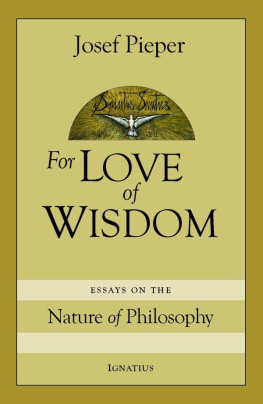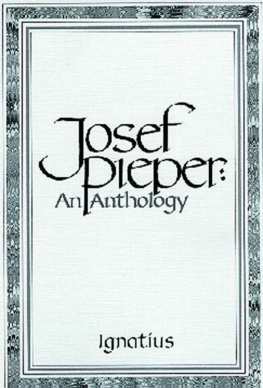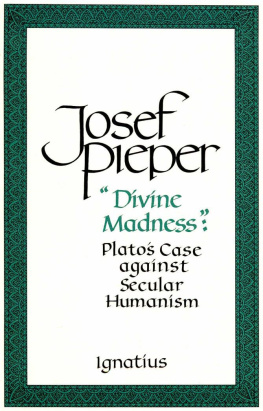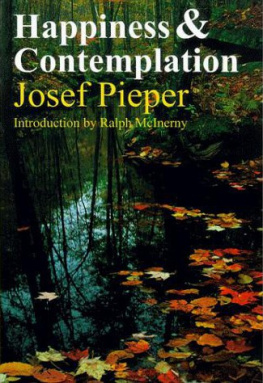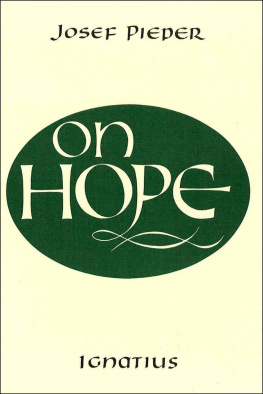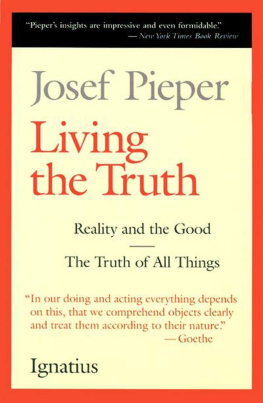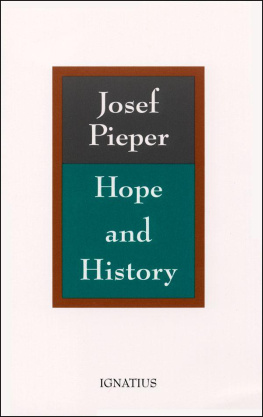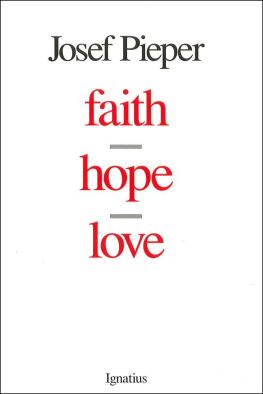Josef Pieper - Guide to Thomas Aquinas
Here you can read online Josef Pieper - Guide to Thomas Aquinas full text of the book (entire story) in english for free. Download pdf and epub, get meaning, cover and reviews about this ebook. year: 0, genre: Religion. Description of the work, (preface) as well as reviews are available. Best literature library LitArk.com created for fans of good reading and offers a wide selection of genres:
Romance novel
Science fiction
Adventure
Detective
Science
History
Home and family
Prose
Art
Politics
Computer
Non-fiction
Religion
Business
Children
Humor
Choose a favorite category and find really read worthwhile books. Enjoy immersion in the world of imagination, feel the emotions of the characters or learn something new for yourself, make an fascinating discovery.
- Book:Guide to Thomas Aquinas
- Author:
- Genre:
- Year:0
- Rating:5 / 5
- Favourites:Add to favourites
- Your mark:
- 100
- 1
- 2
- 3
- 4
- 5
Guide to Thomas Aquinas: summary, description and annotation
We offer to read an annotation, description, summary or preface (depends on what the author of the book "Guide to Thomas Aquinas" wrote himself). If you haven't found the necessary information about the book — write in the comments, we will try to find it.
Guide to Thomas Aquinas — read online for free the complete book (whole text) full work
Below is the text of the book, divided by pages. System saving the place of the last page read, allows you to conveniently read the book "Guide to Thomas Aquinas" online for free, without having to search again every time where you left off. Put a bookmark, and you can go to the page where you finished reading at any time.
Font size:
Interval:
Bookmark:
GUIDE TO THOMAS AQUINAS
JOSEF PIEPER
Thomas Aquinas
Translated from the German by
Richard and Clara Winston
IGNATIUS PRESS SAN FRANCISCO
Title of the German original:
Hinfhrung zu Thomas von Aquin
1986 Kosel-Verlag, Munich
Third revised edition of
Hinfhrung zu Thomas von Aquin
Cover art by Christopher J. Pelicano
Cover design by Roxanne Mei Lum
Translation 1962 by Pantheon Books
Published 1991 by Ignatius Press, San Francisco
All rights reserved
ISBN 978-0-89870-319-1
Library of Congress catalogue number 90-86251
Printed in the United States of America
CONTENTS
The Occidental century scarcely a harmonious era. Thomas brings in a short spell of classical breadth. Remarks on the Aquinas literature: Chesterton, Grabmann, Chenu, Gilson. What is known concerning Thomas education
Thomas canonization, elevation to doctor of the church and universal teacher. How is Thomas an exemplar? Perfection and originality. His desire to omit nothing whatsoever. The first decisions: for the Bible and Aristotle. The voluntary poverty movement and the beginnings of the Dominican Order
Entrance into the Dominican Order. Evangelical perfection and passion for teaching. His original concern imperiled: the Inquisition. The attitude of St. Thomas. Aristotle and the Christianity of the High Middle Ages. Peter of Hibernia, a new type
Thomas does not become an Aristotelian! Affirmation of the visible world. The historical Aristotle is not in question. As the truth of things stands... What the quotation meansboth for us today and for Thomas v
But for Thomas, Aristotle would no longer speak to our intellects. The problem of unhistorical interpretation. The medieval university: in spite of the facultys doctrinal powers, not a part of the hierarchy; an institution for all of Christendom; tie to the city. Paris: the purest embodiment of the idea of a university
Thomas and Paris, his natural arena. The Mendicant Controversy; the mendicant orders invade the university. The first years of teaching. Beginnings of the written works
Disputation as a literary form. Origins in the Platonic dialogue and the Aristotelian Topics . The structural form of the articulus in the works of Thomas. Spirit of disputation: listening to the interlocutor; respecting his argument and person; addressing oneself to him; refraining from arbitrary jargon; seeking clarity, not sensationalism. The disputation as the realm in which universality is achieved. Possible reason for the degeneration of public discussion today: the lack of proper models
Thomas above all a teacherin spite of multifarious special assignments. Teaching as a mode of intellectual life. Thinking from the beginners point of view. Mastery of the pedagogues trade. Birds-eye view of the major works. The opuscula ; the commentaries; the Quaestiones disputatae ; the two Summas. The Summa theologua as reflection of events
Medieval Latin not a dead language. University and technical language. From Cicero and Seneca through Boethius to Thomas: translation from the Greek, The creative element in this process of assimilation. Verbal beauty in Thomas; language utterly an instrument. Nevertheless, avoidance of artificial technical terminology. Distrust of terminology. Living usage as the standard. Sobriety the expression of extreme receptivity to reality
The task that Thomas set himself: to create an intellectual synthesis in which the natural world and knowledge were given their dueas well as the supernatural and belief, so that both realms achieve full recognition. Pronounced worldliness. Unabashed affirmation of the body. Effect upon the style of theological thought. He simultaneously ranges himself against the secularism of Siger of Brabant and the unworldliness of the dominant theology. Theologically founded worldliness. The arguments from creation and from the Incarnation. The keystone of the Christian West: acceptance of the world along with a receptivity to the supramundane call
Non-Occidental Christianity, The West not the sum of institutions but a historical design. Readiness for ever new conflicts. The existential interpretation of the concept of Being and God. I am Who Am. Existence as a product of the actus purus . Everything that exists is not only good, but holy. The role of philosophising and the role of theologizing in Thomas. The concepts of philosophy and theology. Their co-ordination can be meaningfully discussed only insofar as both are accepted as legitimate acts of the intellect
Philosophy and theology both deal with the Whole of realityinsofar as the encountered phenomena are seen by the gaze fixed upon them and insofar as the speech of God is heard by believers. The problem of methodologically neat delimitation is extraneous here: both philosopher and theologian must be ready to incorporate any available information on reality into their intellectual structures. Ancilla theologiae ? Theology stands in need of the totality of natural knowledge of the world. The Summa theologica not a closed system. Its fragmentary character is part of its statement. Negative theology and negative philosophy. Immunization against false claims of finality
PREFACE
This book is closet to the spoken than to the written language. It is based on a series of university lectures given before collective student bodies. Its purpose and scope are precisely what the title suggests: to serve as a guide and introduction. It is intended neither as a detailed biography of Thomas nor as a systematic and comprehensive interpretation of his doctrines. Nor is it meant to be an original contribution to the historical study of medieval philosophy. Everyone acquainted with the field will see at once to what degree my account is based, far beyond specific quotation, on the works of Marie-Dominique Chenu, Etienne Gilson, Fernand van Steenberghen, and others .
The purpose of these lectures is to sketch, against the background of his times and his life, a portrait of Thomas Aquinas as he truly concerns philosophical-minded persons today, not merely as a historical personage but as a thinker who has something to say to our own era. I earnestly hope that the speculative attitude which was Thomas most salient trait as Christianitys universal teacher will emerge clearly and sharply from my exposition. It is to this end alone, I repeat, that I present the following chapters, and it is this aspect for which I accept full responsibility .
J. P.
GUIDE TO THOMAS AQUINAS
I
So bound up is the life of St. Thomas Aquinas with the thirteenth century that the year in which the century reached its mid-point, 1250, was likewise the mid-point of Thomas life, though he was only twenty-five years old at the time and still sitting at the feet of Albertus Magnus as a student in the Monastery of the Holy Cross in Cologne. The thirteenth century has been called the specifically Occidental century. The significance of this epithet has not always been completely clarified, but in a certain sense I too accept the term. I would even assert that the special quality of Occidentality was ultimately forged in that very century, and by Thomas Aquinas himself. It depends, however, on what we understand by Occidentality. We shall have more to say on this matter.
There exists the romantic notion that the thirteenth century was an era of harmonious balance, of stable order, and of the free flowering of Christianity. Especially in the realm of thought, this was not so. The Louvain historian Fernand van Steenberghen speaks of the thirteenth century as a time of crisis of Christian intelligence;
What, in concrete terms, was the situation? First of all we must point out that Christianity, already besieged by Islam for centuries, threatened by the mounted hordes of Asiatics (1241 is the year of the battle with the Mongols at Liegnitz)that this Christianity of the thirteenth century had been drastically reminded of how small a body it was within a vast non-Christian world. It was learning its own limits in the most forceful way, and those limits were not only territorial. Around 1253 or 1254 the court of the Great Khan in Karakorum, in the heart of Asia, was the scene of a disputation of two French mendicant friars with Mohammedans and Buddhists. Whether we can conclude that these friars represented a universal mission sent forth out of disillusionment with the old Christianity, is more than questionable. But be this as it may, Christianity saw itself subjected to a grave challenge, and not only from the areas beyond its territorial limits.
Next pageFont size:
Interval:
Bookmark:
Similar books «Guide to Thomas Aquinas»
Look at similar books to Guide to Thomas Aquinas. We have selected literature similar in name and meaning in the hope of providing readers with more options to find new, interesting, not yet read works.
Discussion, reviews of the book Guide to Thomas Aquinas and just readers' own opinions. Leave your comments, write what you think about the work, its meaning or the main characters. Specify what exactly you liked and what you didn't like, and why you think so.

